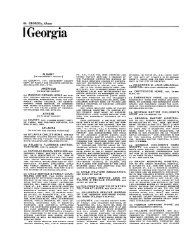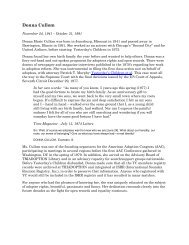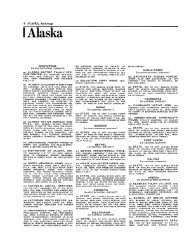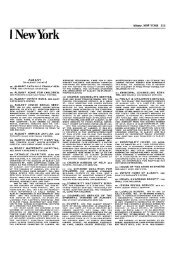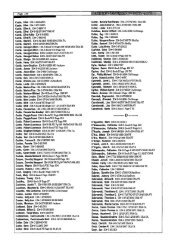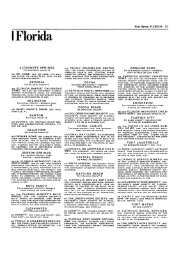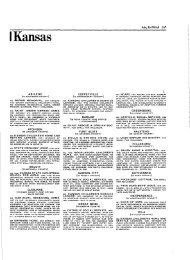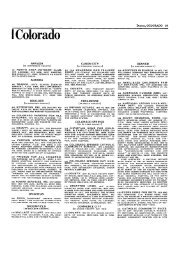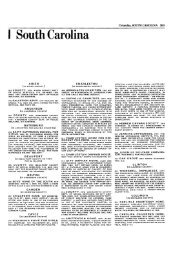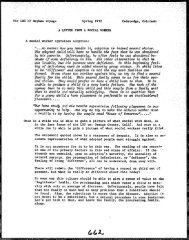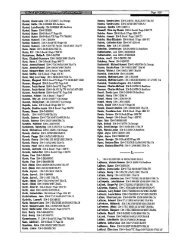TRIADOPTION ® Library, Inc. - CA ~ Pg 369-480
TRIADOPTION ® Library, Inc. - CA ~ Pg 369-480
TRIADOPTION ® Library, Inc. - CA ~ Pg 369-480
You also want an ePaper? Increase the reach of your titles
YUMPU automatically turns print PDFs into web optimized ePapers that Google loves.
. .<br />
e<br />
Adoption is the then1 for the entire sumnler It is difficult, however, to be tolerant with<br />
issue of PUBLIC WELFARE magazine. lt carries those who still adhere to the philosophy that<br />
articles of wi de-rangi ng interest to anyone adoptees who search to "resolve problems of idwhose<br />
life is touched in any way by the legal , entity; to assuage feelings of rejection" exhibit<br />
moral and sensitive issues associated with the "symptoms of obvious emotional disturbance. "8 It<br />
adoption process. Lawyers, judges, social<br />
is a threat to adoptees that professional counselworkers,<br />
operators of chi 1 dren ' s homes, obste- ors currently accept attitudes of several decades<br />
tricians, family physicians, psychiatrists, ago. Is it asking too much that all professionals<br />
psychologists, court clerks, hospital workers, should be able to place adoptees' identity and<br />
ministers, priests and lay counsellors should rejection feelings in their relative place? It is<br />
find new insights to Letter understand members true that fixation with any subject can be the<br />
of the adoption triangle* who are so emotion- cause of mental .disorder. The author suggests that<br />
al 1 y involved and personally affected by the only adoptees who search and have those feelings<br />
burning questions relating to their own status exhibit symptoms of emotional disturbance; apparas<br />
a triangle member.<br />
ently adoptees who do not search but have these<br />
As human nature is wont to be, trialigie<br />
feelings lack them, at least in his view.<br />
members are most likely to support or reject<br />
expressed views in the articles according to<br />
Persistent feelings of rejection and<br />
which point of the triangle the reader repre-<br />
alienation have been documented even in<br />
sents. Acknowlec'ging this bias one should<br />
the most-loved adopted children . . . -<br />
still not be blinded by logical arguments "If your relationship with your adopted<br />
supporting views contrary to those of the<br />
chi 1 d is a happy. and secure one, lie ui 1-1.<br />
reader. ,Compel 1 i ng cogent rationale is de-<br />
not neet or want to search for his first<br />
veloped in several articles. For example<br />
parents. He wi 11 know that you are his<br />
(and contrary to many adoptees own viewpoint), - real, parents".<br />
!<br />
many adoptive parents feel "outraged, incensed,<br />
This 1 ine has been contradicted by<br />
and betrayed"2 about adoptee searches and be- many adoptees, who insist that it is<br />
lieve that these searches are already changing their civil right to have access to<br />
adoption to permanent foster care.3 Whi 1 e<br />
information about origins. 9<br />
adoptees acknowledge misgivings by adoptive There is indeed a fine line between those who search<br />
parents, the depths to which these feelings and those who do not. And it is yet to be shown .that<br />
run is made abundantly clear in the magazine.<br />
by crossing the search/non-search 1 ine proves obses-<br />
Birthparents, on the other hand, must be rightsion<br />
to the point of emotional disturbance. Suppress<br />
eously livid at one author's definition of the ed desires to search because of compassion for<br />
adoption triad as including "adoptive parents,<br />
adoptive parents could also lead to emotional disadoptee<br />
and agencyU4, which must be like owning<br />
turbance, but the author disregards this most obviou<br />
your own tennis court and your guests choose to<br />
correlation. Not knowing one's orgins and all that<br />
exclude you from play. Adoptive parents are unknowledge<br />
encompasses is indeed stressful :<br />
1 i kely to a &nowledge that birthparents of the<br />
triangle who have 1 ater become adoptive parents<br />
Our findings would tend to validate the<br />
themselves have the same firsthand unck rstandin<br />
impressions garnered from the literature<br />
of the adoptive parents' role as an adoptive<br />
review that adoptees are more vulnerable<br />
parent who has never relinquished a child.5<br />
than the population at large to the develop-<br />
While there are similarties, and perhaps the<br />
ment of identity problems in late adolescence<br />
author intended no more than that, the distincand<br />
young adulthood because of the greater<br />
tion is remarkable.<br />
1 i kel i hood of encountering difficulties<br />
On the other hand, some articles contained<br />
in the working through of the psychosexual,<br />
blatant distortion of facts, reasoning on basic<br />
psychosocial , and psychohis~grical aspects<br />
issues warped by col 1 ateral considerations and<br />
of personal i ty devel opmnt .<br />
chain of logic - misdirected by preconceived<br />
Ideas.<br />
One be if at least The relationship of the search versus concern for<br />
forgiving of a writer whose agency appears to<br />
adoptive parents1 feel ings is expressed in this<br />
be threatened by economi c 1 oss shoul d adoption<br />
account :<br />
laws be chanqed, - - or fearful that the aqency's<br />
continuing power and knowledge of adoptees- is<br />
diminished as adoptees "bypass agenciesM6<br />
during their search. Regarding the latter point<br />
many adoptees would hasten to add that this was<br />
a direct resul t of the agencies' refusal to even<br />
be considerate of adoptee searchers, let alone<br />
helpful, even in states where agencies are not<br />
legally bound to withhold information. Advice<br />
given several years ago still goes unheerdetl by<br />
many agencies :<br />
Adoption agencies have contributed<br />
to the confusion by assuming the role<br />
of protector, in which capacity they<br />
have become watchment and censors of<br />
the truth. The results have often been<br />
negative, large1 y because the information<br />
given out by adoption agencies has<br />
been recognized as shadowy, unreal, and<br />
therefore, unsatisfying to the adoptee.<br />
Withheld data does not protect adoptees,<br />
but instead gives them the feeling that<br />
full information would reveal "ahful<br />
truths." ..... The time has come for<br />
adoption agencies to establish programs<br />
I<br />
and to set up procedures to meet these<br />
challenges. The agency should begin by<br />
accepting the adult adoptee as a full<br />
client. who has the riqht to complete<br />
I<br />
information and to the cooperation of<br />
the agency .Pf<br />
I think it is the most natural and<br />
desirable aspect of any adolescent or<br />
young adult person to have curiosity about<br />
his forbears, about his biological heri tage<br />
and the sequence of his generational connectedness.<br />
I would consider this the most normal,<br />
indeed desireable, kind of curiosity . . .<br />
I think that continued secrecy about the information<br />
concerning one's natural parents<br />
poisons the relationship between the adoptive<br />
parents and the adopted person. What it does<br />
is build an aura of guilt and conflict over<br />
that very natural, heal thy, at. inevitable<br />
curiosity. ... That is why the quest of the<br />
adopted ?erson for informati n is so painful<br />
and so fused with guilt. ? 1<br />
It i s just not possible to cite the many authorities<br />
who so characterize the adoptee's search.<br />
It may be convenient for a psychologist to quantify<br />
the adoptee's action to intiate a search as<br />
prima facia evidence of an emotional disturbance<br />
symptom, but so would characterization of a lot<br />
of other human actions make for simplified treatment--IF<br />
IT WERE TRUE. Does an adoptive parent's<br />
genuine fear of his or her children's search for<br />
birthparents qua1 i fy as symptom of mental disorder?<br />
It would be totally without foundation as<br />
indeed the prior finding has been.




